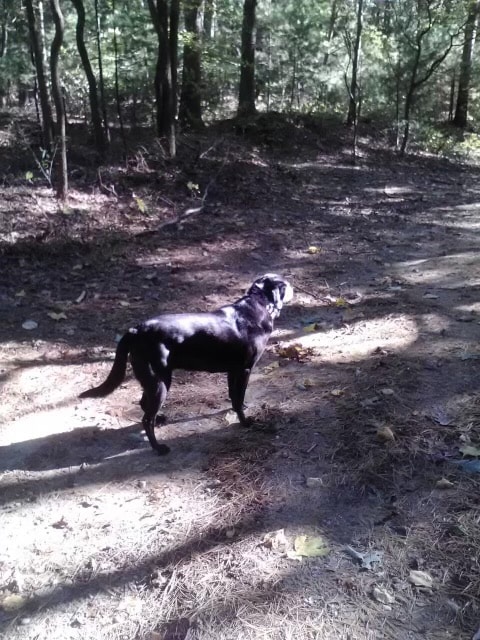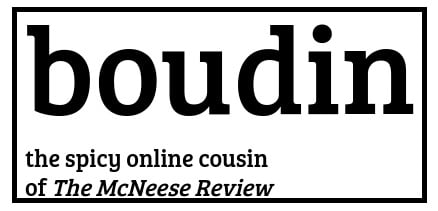Rhumbline
Lucinda Kempe
__________
Comus was a black Labrador and came from a breeder on Long Island. Rhumbline Retrievers is run by Susan and her husband Joe. Rhumbline is a nautical term for a straight line between two points.1 Both Susan and her husband had worked in the merchant marine. When we went to visit the puppies, I discovered the nautical connection. It felt like fate. My mother and I had been regulars in the Greek merchant marine bars on Decatur Street in New Orleans. I made my unofficial “debut” there. Plus, my mother had made her debut in the Comus ball in the 40s so what else could I call her? Decatur? No. Comus was perfect. In mythology, Comus, the god of excess, is depicted as a winged youth or a young satyr. As a teen, I was a paradigm of acting out and misbehavior. I grew up feeling that my mother loved her dogs more than me. In fact, I pretended to be a dog as a little girl to get her attention.
Calm heavyset woman, almost masculine, a take-no-prisoner personality, Susan picked the pup for us. Pink girl was her first name. The pups are named by the color of the ribbon’s Susan places on their necks. She only names her own dogs. Name it and it’s yours—the “it” disappears and becomes what you hope is a “person in a dog suit” as Maud Ellen called special dogs. My mother never owned a breed dog. She rescued stray dogs, cats, and men, a habit I inherited from her.
She only liked dogs and books.
In the last picture I took of Comus, her black fur shines in the dappled sunlight filtering through the trees of Sunken Meadow Park. She looks away from me. I had her off-leash. She had a great recall.
“I’m here to train you, not the dog,” the Syosset dog trainer had said.
Comus never jumped on beds or sofas, never bolted with a lamb shank
or turkey in her maw, never tore out of the front door or pawed manically like Skouria, my mother’s Saigonese Street dog she picked up off a Greek freighter when she was picking up some sailor. Unlike Skouria, who returned from a peregrination with a stab wound in his chest, Comus was a docile darling—she chewed a slipper once. I loaned her to friends who were thinking of getting a dog. The husband was wary of dogs.
“Man, she didn’t go near the kid’s lunches on the coffee table,” Lee said.
She won them over. They got a dog. Another friend got a black Lab for her son after they fell in love with her—he was a big fellow with a thick neck, nothing like Comus, who was never more than sixty pounds.
Comus had a “soft” mouth which meant she held her retrieves gently, never biting down hard. The only thing she gobbled was food. I fed her kibble and I suspect the kibble contributed to her stomach cancer. She was dead at age ten. Kibble bloats the gut.
“She’s aged five years in six months,” the vet said when I brought her in, “There’s a mass in her stomach.”
She’d been throwing up, but I thought she’d eaten something outside.
“I’ll be here on Monday, if you can wait that long.”
Thirty-six hours after the diagnosis, Comus was gone. She died almost as fast as my mother except Maud Ellen lingered for two months before heading into the great library in the sky.
The diagnosis was made on a Friday. Comus collapsed on Sunday. All four of us took her in. The kids didn’t want to go, but I said, “The best person in the house is leaving the earth. We can’t let her go alone.”
My mother was wrong. Dogs aren’t people in dog suits. They’re dogs, but in keeping with Orwell’s “some pigs are better than others,” some animals are better than people. They behave well. They teach patience and civility. They’re paradigms of good.
I buried my mother’s ashes with Comus’s body in our Yankee garden. We’d picked up stray cats, dogs, and men together. It was more than appropriate. It was freeing. I haven’t gotten another dog since. I let my mother die alone in a third-rate nursing home in New Orleans as payback for all she had and hadn’t done but burying her ashes I’d held onto for twelve years with the body of a beloved dog gave me closure.
That day in the woods when Comus stood on the path, the dappled light on her coat, its shine, the glint of the prong collar I used so she wouldn’t pull, her back legs still had muscle tone. In the photograph, she appears to be already leaving, sensing or scenting something. Maybe Comus heard a voice, a call. Was it my mother? Maybe she knew she was needed. Dogs are smart. They know where they belong.
The dog became the rhumbline between me and my dead mother.
Her name was Comus. We called her Coco. We called her love.
1. An imaginary line on the earth’s surface cutting all meridians at the same angle, used as the standard method
of plotting a ship’s course on a chart.
2. Any of the 32 points of the compass.
__________
Dedication
To all the animal rescuers.

__________
Lucinda Kempe‘s work has been published or is forthcoming in Flash Fiction Review, Centaur, The Disappointed Housewife, Unbroken Journal, New South Journal, New World Writing, Southampton Review, and The Summerset Review. An excerpt from her memoir was short listed for the Fish Memoir Prize in April 2021. She lives on Long Island where she exorcises with words.
__________

To learn more about submitting your work to Boudin or applying to McNeese State University’s Creative Writing MFA program, please visit Submissions for details.
Posted in Boudin April '24 Pet and tagged in #boudin, #fiction
